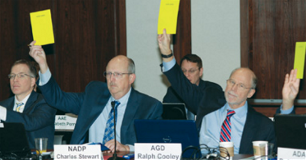
Code Maintenance Committee approves new scaling code
The Code Maintenance Committee approved a new scaling code that fills a gap in the continuum of care for patients with gingival disease and no attachment loss.
“Scaling in the generalized presence of moderate or severe gingival inflammation — full mouth, after oral evaluation,” was among 11 new codes and four revisions for CDT 2017. The Code Maintenance Committee held its annual meeting March 3-4 at ADA Headquarters to discuss requests to change, add or delete sections of the Code of Dental Nomenclature.
“Current codes document treatment procedures for patients with a healthy periodontium or patients with periodontal disease that has accompanying loss of attachment — such as periodontal pockets and bone loss,” said Dr. Ronald Riggins, committee chair. “However, there is no CDT code available to record therapeutic treatment of patients with gingival disease and no attachment loss.”
Current prophylaxis code D1110 documents a preventive procedure that applies to patients with healthy periodontium. There is a jump to codes D4341 and D4342, which are therapeutic procedures indicated for patients who require both scaling and root planning because of loss of attachment. The new code falls under the periodontics category within the CDT manual. As with all CDT codes, any practitioner may deliver the service according to their state’s dental practice act.
“Because this is new territory for dentists and insurers, several of the groups represented on the Code Maintenance Committee are coming together to develop education material so practitioners may understand and use the new CDT code appropriately.
The Code Maintenance Committee also approved four new codes related to case management. These services address overcoming why patients don’t keep their appointments; coordinating care; patients’ motivation to comply with treatment plans; and patient education to improve health literacy. These codes will fall under the adjunctive category as nonclinical services.
The ADA chairs the Code Maintenance Committee meeting and has five votes; each specialty organization plus the Academy of General Dentistry and the American Dental Education Association have one vote each; and each payer organization has one vote each.
“This year we again had a number of people observe the meeting, including several dentists, and participate in the public comment portion to convey their thoughts on their own change requests or ones submitted by others,” Dr. Riggins said. “Those who submitted action requests also answered specific questions from committee members about their changes before the committee voted.”
The committee will accept change requests for CDT 2018 until November and all requests will be considered during the next meeting in March 2017. For more information on the Code Maintenance Committee and CDT, visit ADA.org/publications/CDT.
“Scaling in the generalized presence of moderate or severe gingival inflammation — full mouth, after oral evaluation,” was among 11 new codes and four revisions for CDT 2017. The Code Maintenance Committee held its annual meeting March 3-4 at ADA Headquarters to discuss requests to change, add or delete sections of the Code of Dental Nomenclature.
 Dr. Riggins |
Current prophylaxis code D1110 documents a preventive procedure that applies to patients with healthy periodontium. There is a jump to codes D4341 and D4342, which are therapeutic procedures indicated for patients who require both scaling and root planning because of loss of attachment. The new code falls under the periodontics category within the CDT manual. As with all CDT codes, any practitioner may deliver the service according to their state’s dental practice act.
“Because this is new territory for dentists and insurers, several of the groups represented on the Code Maintenance Committee are coming together to develop education material so practitioners may understand and use the new CDT code appropriately.
The Code Maintenance Committee also approved four new codes related to case management. These services address overcoming why patients don’t keep their appointments; coordinating care; patients’ motivation to comply with treatment plans; and patient education to improve health literacy. These codes will fall under the adjunctive category as nonclinical services.
The ADA chairs the Code Maintenance Committee meeting and has five votes; each specialty organization plus the Academy of General Dentistry and the American Dental Education Association have one vote each; and each payer organization has one vote each.
“This year we again had a number of people observe the meeting, including several dentists, and participate in the public comment portion to convey their thoughts on their own change requests or ones submitted by others,” Dr. Riggins said. “Those who submitted action requests also answered specific questions from committee members about their changes before the committee voted.”
The committee will accept change requests for CDT 2018 until November and all requests will be considered during the next meeting in March 2017. For more information on the Code Maintenance Committee and CDT, visit ADA.org/publications/CDT.






